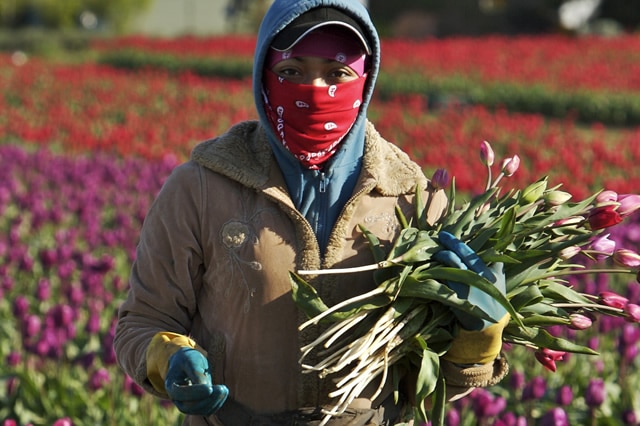Help our local partners realise their vision of hope for their communities

Yesterday (17th November 2014), members of the House of Lords participated in the Second Reading of the Modern Slavery Bill.
Baroness Cox’s speech focused on three key areas of the Bill that require amendments in order for it more completely confront slavery in its many forms.
Slavery in Supply Chains
A number of Lords, following the recent short debate on Slavery in Supply Chains that was tabled by Baroness Kennedy of Cradley, suggested that the Bill failed to adequately tackle slavery in supply chains. Baroness Cox highlighted that “Every day, millions of modern-day slaves are forced to work in appalling conditions for derisory or no pay. Their suffering is too often hidden at the bottom of long, complex international supply chains which allow some big companies to abdicate responsibility and ignore the suffering involved in the manufacture of many low-price products.”
She pointed out that forced labour was routinely use in some of the largest British high-street stores and supermarkets, “Therefore, legislation to ensure scrutiny of the exploitation and working conditions of those at the very bottom of the supply chain is crucial… It is essential that minimum measures of disclosure are specified, particularly the requirements, as mentioned by the right reverend Prelate the Bishop of Derby, that such information be published in each company’s directors’ report and that this reporting should be annual and progressive.” These measures would create a level playing field for businesses that do ensure that slavery is not present in their supply chains.
Migrant Domestic Workers
Secondly, Baroness Cox highlighted “the plight of overseas domestic workers, who remain excluded in spite of strong recommendations from the Joint Committee on the draft Bill. It found that the current visa system, introduced in April 2012, “unintentionally strengthened the hand of the slave master against the victim of slavery”, and recommended the restoration of the pre-2012 visa. All the evidence shows that migrant domestic workers remain in a situation of vulnerability, which is morally unacceptable and which undermines the intentions of the Bill. The protections for migrant domestic workers promised by the Minister, such as handing them an information card on entry to the UK or clarifying the contracts submitted with applications for the visa, are welcome, but they cannot replace the basic rights of changing employer and renewing a visa. I hope that the Minister will be able to give assurance of sympathetic consideration of amending the Bill to solve that problem.”
The NGO Kalayaan works to provide advice, advocacy and support services in the UK for migrant domestic workers, please visit their website for more information.
Global Slavery
Baroness Cox’s final point was that, at present, the Bill does not sufficiently address slavery on a global scale: “The title of the report from the Modern Slavery Bill Evidence Review, ‘Establishing Britain as a World Leader in the Fight against Modern Slavery’, reflects the laudable aspirations of the Government. However, while tackling modern slavery in the UK—including human trafficking—is a moral imperative, it may not impact what is truly a global issue and may also move the problem to other areas of the globe. The Global Slavery Index estimates the number of slaves in the UK to be between 4,200 and 4,600. While that is 4,200 or 4,600 too many, and nothing can lessen the tragedy for each individual, it is a drop in the ocean compared with the global estimate of nearly 30 million.”
In Baroness Cox’s work with HART she has “been involved with the redemption of hundreds of slaves in Sudan, abducted by the regime in Khartoum; I have met victims of sexual slavery and forced labour in Burma; children and teenagers abducted by the notorious Lord’s Resistance Army in Uganda, who were subjected to indescribable brutality; and Devadasi, or temple prostitutes, in India. I have heard, too often, their anguished, heart-wrenching stories. Their experiences also highlight the need for appropriate aftercare, which is currently inadequate in this country, but which is sadly all too often completely lacking for victims in other countries.”
Baroness Cox went on to suggest three practical amendments to the Bill to address global slavery:
- The Bill should signal the intent of the British Government to expose and tackle slavery globally. Britain would then need to take practical, collaborative action “to engage every sector of society in the fight against slavery”.
- “There should be a requirement for all British embassies, high commissions and consulates to assess the prevalence of slavery in the countries where they are located, regardless of whether there is a direct link to the UK, and to support collaborative programmes, especially on-the-ground anti-trafficking and anti-slavery initiatives.”
- An Annual Report should be published to “assess the extent of modern slavery globally”, and report on the progress of initiatives to address the issue.
“If the Bill is to achieve the Government’s stated intention to establish Britain as a ‘world leader in the fight against modern slavery’, the UK must be at the forefront of making everywhere in the world a “no-go zone” for human trafficking and slavery, shining a light on modern slavery wherever it is taking place and facilitating the sharing of skills, expertise and resources to expose and eradicate slavery in all its forms, everywhere. Only then can Britain truly claim to be a world leader.”
Learn More
You can watch the debate here (Baroness Cox’s speech is at 17:00)
You can read the full text of the debate here: Part 1 and Part 2